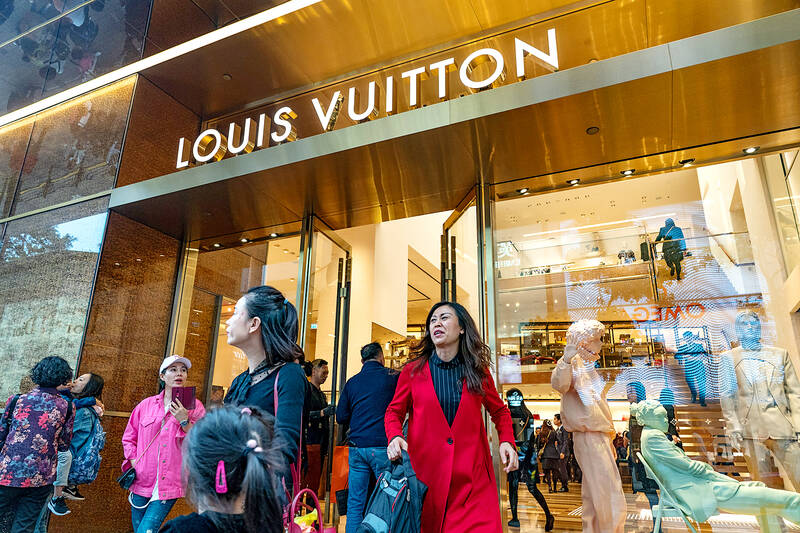After a year of record sales and profits, despite slowing global growth, the luxury sector is looking to the reopening of China to deliver further expansion this year.
The world’s largest luxury group, LVMH Moet Hennessy Louis Vuitton SE, posted a 23 percent jump in sales to a record of 79 billion euros (US$84.66 billion) last year, and saw profits climb 17 percent to 14 billion.
LVMH CEO Bernard Arnault wants to continue along that path this year, “at the risk of becoming boring.”

Photo: Bloomberg
LVMH’s rivals also managed blistering growth in sales and profits last year.
Sales at Hermes International SCA jumped 29 percent to 11.6 billion euros, and profits soared 38 percent to a record 3.4 billion.
Kering SA, despite a tough time for flagship brand Gucci, still managed a 15-percent increase in sales to 20 billion euros, while profits rose 14 percent to 3.6 billion.
Ferrari NV also saw sales race to a new record of 5 billion euros, delivering 13,221 vehicles last year.
Last year’s results were barely dented by the disruption in China linked to end of travel restrictions related to the COVID-19 pandemic, and the country’s progressive lifting at the end of the year, with LVMH calling the December period an “air pocket.”
Hermes was the only luxury brand to escape unscathed.
“There was no drop in traffic in our stores,” Hermes CEO Axel Dumas said.
The company’s sales rose 30.7 percent in its Asia-Pacific region excluding Japan.
The gradual reopening of China — which abandoned the last of its draconian “zero COVID” restrictions on Jan. 8 — should help its economy expand by 5.2 percent this year, according to the IMF’s latest forecast.
With the restrictions having restrained consumption, the reopening of the Chinese economy is being looked at as a growth opportunity for this year.
Analysts at UBS Group AG say this year is to be the “year of the Chinese consumer,” noting that the pandemic restrictions pushed down the share of Chinese consumers in global luxury spending to 17 percent last year, compared with 33 percent before 2020.
“The Chinese clientele is much more important than it was in 2019,” LVMH financial director Jean-Jacques Guiony said.
Guiony does not expect Chinese tourists to return to Europe, where they traditionally spent heavily on luxury goods, before next year.
Instead, luxury groups are focusing on Chinese consumers at home.
Arnault said it was no secret that China needs growth and that the government would likely take steps to facilitate economic expansion as the country reopens.
“If that is indeed the case — and it began in the month of January — we have every reason to be confident, even optimistic about the Chinese market,” he said.
China is a “volcano ready to explode,” said Arnaud Cadart at asset manager Flornoy Ferri.
“There is an incredible amount of savings that has been built up, an incredible reserve in the hands of the well-off class which wants to purchase luxury goods,” he added.
Cadart estimated the luxury market in China could jump by 30 percent this year.
Kering CEO Francois-Henri Pinault visited China at the end of last month and said he was amazed by the people thronging stores “like the virus had never been in China.”
“This is a good sign,” he said.

The Eurovision Song Contest has seen a surge in punter interest at the bookmakers, becoming a major betting event, experts said ahead of last night’s giant glamfest in Basel. “Eurovision has quietly become one of the biggest betting events of the year,” said Tomi Huttunen, senior manager of the Online Computer Finland (OCS) betting and casino platform. Betting sites have long been used to gauge which way voters might be leaning ahead of the world’s biggest televised live music event. However, bookmakers highlight a huge increase in engagement in recent years — and this year in particular. “We’ve already passed 2023’s total activity and

Nvidia Corp CEO Jensen Huang (黃仁勳) today announced that his company has selected "Beitou Shilin" in Taipei for its new Taiwan office, called Nvidia Constellation, putting an end to months of speculation. Industry sources have said that the tech giant has been eyeing the Beitou Shilin Science Park as the site of its new overseas headquarters, and speculated that the new headquarters would be built on two plots of land designated as "T17" and "T18," which span 3.89 hectares in the park. "I think it's time for us to reveal one of the largest products we've ever built," Huang said near the

China yesterday announced anti-dumping duties as high as 74.9 percent on imports of polyoxymethylene (POM) copolymers, a type of engineering plastic, from Taiwan, the US, the EU and Japan. The Chinese Ministry of Commerce’s findings conclude a probe launched in May last year, shortly after the US sharply increased tariffs on Chinese electric vehicles, computer chips and other imports. POM copolymers can partially replace metals such as copper and zinc, and have various applications, including in auto parts, electronics and medical equipment, the Chinese ministry has said. In January, it said initial investigations had determined that dumping was taking place, and implemented preliminary

Intel Corp yesterday reinforced its determination to strengthen its partnerships with Taiwan’s ecosystem partners including original-electronic-manufacturing (OEM) companies such as Hon Hai Precision Industry Co (鴻海精密) and chipmaker United Microelectronics Corp (UMC, 聯電). “Tonight marks a new beginning. We renew our new partnership with Taiwan ecosystem,” Intel new chief executive officer Tan Lip-bu (陳立武) said at a dinner with representatives from the company’s local partners, celebrating the 40th anniversary of the US chip giant’s presence in Taiwan. Tan took the reins at Intel six weeks ago aiming to reform the chipmaker and revive its past glory. This is the first time Tan